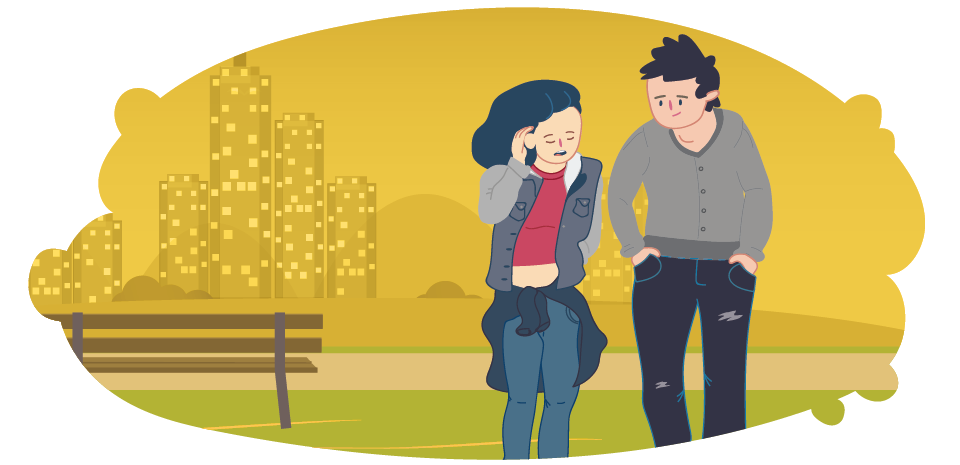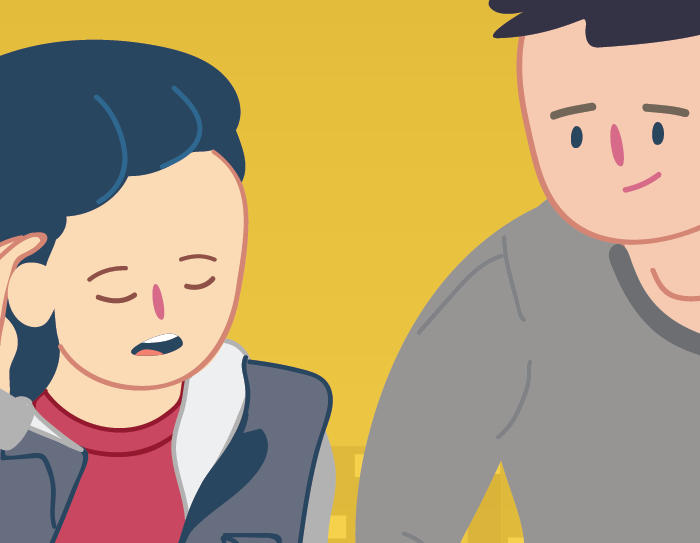Coming Out and Disclosure
Coming Out and Disclosure are about choosing whether you share your sexuality and/or gender with others in your life. Read on to find out more.

This article was written and reviewed by people in the LGBTIQA+ communities.
Coming Out vs. Inviting Others In vs. Disclosure
What’s the difference?
- LGBTIQA+ people usually go through a lot of questioning and learning about themselves before deciding if they want to share their sexuality and gender identity with other people. There are some different ways people might talk about this idea.
- “Coming Out” is a saying that means someone has decided to openly share their sexuality or gender identity with others.
- Some people don’t like this saying because they think it gives the impression that the approval of straight and cisgender people is needed for someone to “Come Out” (Like: “Oh, you’ve finally decided to be honest with us!”).
- “Inviting Others In” is another saying that means openly sharing one’s sexuality or gender identity, or information about their body and medical history, but in a way that involves more choice, trust and love in the people that are told.
- Some people don’t like this saying because they think it gives the impression that there is always choice and that others will always respond positively, which is not always the case.
- The word “Disclosure” is a another way of describing how non-binary and Trans people share their gender identity/history with others to let them know their gender is different to their assigned sex.
- Some people think Disclosure is a more neutral way of talking about “Coming Out” and/or “Inviting Others In”.
No two Disclosures are the same
Disclosure is something that people in LGBTQA+ communities go through in many different ways. Usually more than once.
Some people may have to disclose both their sexual and gender identity, and intersex variation, with important people in their life.
Even before they have Disclosed, some people can feel worried about life changes and risks that may follow being open about their identity.
Some people have to think about issues like racism (if they are from a diverse cultural background) or their religion (if this is a big source of support for them) before making the decision to Disclose.
Because of the risk of being rejected and discriminated against, some people have to think carefully about their level of independence, living arrangements, money situation and the attitudes of the people they live near before Disclosing.
Discrimination is another issue for some people when Disclosing, even within LGBTIQA+ communities. For example, bisexual, non-binary, Trans, asexual and intersex people may be discriminated because of misunderstandings about their identities.
Challenges to sharing info about your sexuality, gender, body and history
- Many people have positive experiences Disclosing when it is among people that are trustworthy and supportive.
- There is a common assumption that everyone is straight, has a male or female body, and identifies as a man or woman. For this reason, people in LGBTIQA+ communities are in situations where they may be Disclosing often.
- Unfortunately, some people have negative experiences like feeling invalidated, being outed, major relationship conflicts and being discriminated against. Some people might even have negative experiences before Disclosing anything about themselves. For this reason, people in LGBTIQA+ communities are at a higher risk for developing mental health problems than others.
- To help keep themselves safe, some LGBTIQA+ people may be open about their identity or body to some people but not others. Like being open about themselves at school, but private in front of their family.
- With the hard work of LGBTIQA+ rights advocates and allies, more and more people are growing up surrounded by others that are supportive of their sexuality or gender identity and bodies.
"When I was 16 I started dating this girl. She was amazing and all I wanted to do was tell the whole world."
Experiences for intersex people are often different
Intersex people have bodies that don’t fit what doctors expect for female or male bodies. Many intersex variations are genetic, and intersex people usually have a very different experience of learning these and Disclosing them to other people.
People with intersex variations may not connect their experiences with the word “intersex”, or may not be involved with the intersex community unless they have access to positive, accurate words and information about being intersex.
This includes being told about their bodies by their parents or doctors. This can be a very medical experience, sometimes without having any say in the matter.
Misunderstanding about what intersex means can also make it hard for people to accept themselves and connect with others. Sometimes, sharing information about an intersex variation with others can be a lot like sharing a sexual or gender identity, but sometimes not.
Tips for Inviting Others In and Disclosing in a safer way
Check these out too:
Sexual, gender and bodily diversity discrimination
Many LGBTIQ+ people experience discrimination that can affect their lives. Learn more ...
READ MEGender Identity
There’s more to gender identity than being male or female. Learn ...
READ MESexual Identity
Relationships come in many forms. Learn more about sexuality and the different ...
READ MELGBTIQ+: The Ultimate Dictionary
A list of important words you’ll hear used in LGBTIQ+ communities
READ METalking helps! We’re here for you.
No problem is too big or too small.
We're here 24 hours a day, 7 days a week






